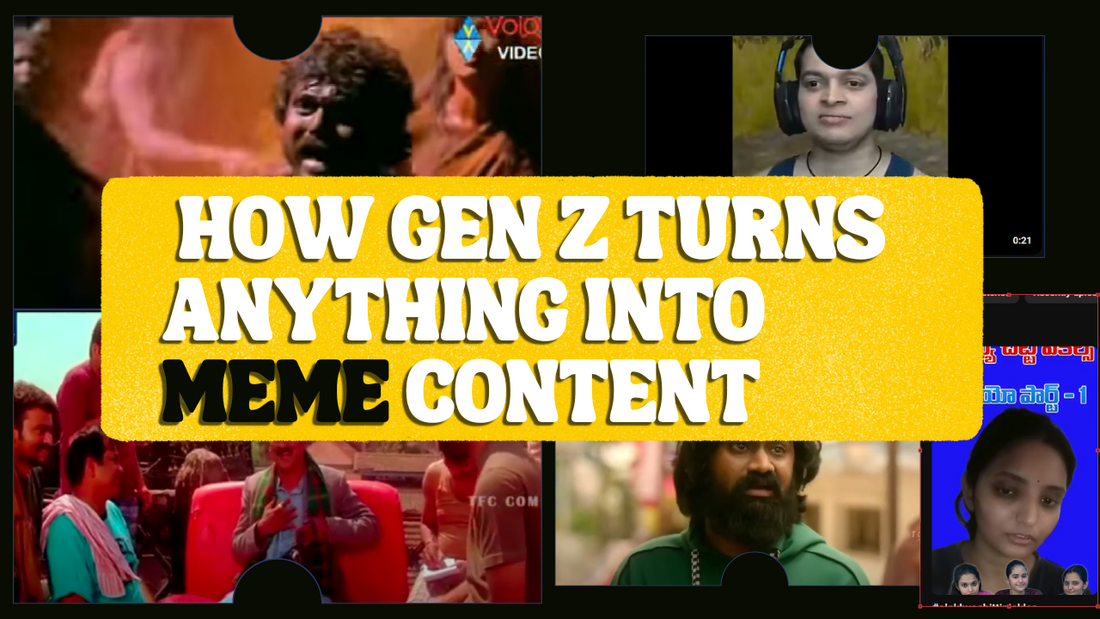
Telugu Memes Aren’t Just from Movies Anymore: How Gen Z Turns Anything into Meme Content
Memes have become the heartbeat of digital life in Telugu culture. They are no longer just jokes copied from movies but a new way of communication that blends cinema, YouTube, and even random viral clips. For today’s youth, memes carry humor, identity, and belonging. A single line can capture emotion better than paragraphs, and it spreads instantly across groups, platforms, and even generations.
Telugu Memes and Gen Z Culture
Memes in Telugu are no longer just funny pictures on the internet. They have become a cultural language for Gen Z, shaping the way young people talk, laugh, and stay connected.
A single punchline from a film or a YouTuber’s casual remark can travel faster than news and turn into the shorthand for emotions that are hard to put into words.
Famous Telugu Meme Dialogues from Movies
Some dialogues have become timeless because of memes. From Yuganikokkadu, “Rey evarra meerantha” is still used when you see people who look unfamiliar or strange, almost like asking “Who are you guys?” in a playful or questioning tone. The same film gave us “Asalu meekem rights unnay andi ikkadiki teeskochi champadaniki,” which is now a sarcastic favorite in debates and arguments.
Venky movie is a goldmine of meme material. “We enjoyed a lot, sar” is casually used in conversations even today whenever friends recall a fun event. The train sequence from Venky became a universal meme template for Telugu youth, used to describe anything chaotic and hilarious. Even smaller lines like “Excuse me” and “Aa navventra” continue to appear as reaction memes.
From Jathi Ratnalu, the dialogue “Naa vallane problem aithe nenellipothara” became iconic because it captures overthinking perfectly, making it fit for everything from relationships to workplace jokes.
YouTube Influencers and Telugu Meme Culture
It is not just Tollywood anymore. YouTube creators and influencers have also added their voices to this culture. Popular Telugu Gaming Youtuber named unq gamer made “Sai raam Sai raam” an instant classic for expressing frustration in a funny way.
Abba Sairam vs Sai Raam Sai Raam Memes
In Telugu meme culture, two simple phrases carry completely different moods even though they sound similar. From the movie Dubai Seenu, the dialogue “Abba Sairam” became popular as an expression of relief. People use it when they just escape a problem or finally feel at ease, almost like taking a deep breath and saying “thank God.”
On the other hand, unqGamer made “Sai Raam Sai Raam” famous as a disappointed reaction. It is now the go-to line whenever someone feels frustrated, let down, or helpless. One is relief, the other is despair.
Viral Meme Lines Beyond Movies

One of the most popular lines that entered meme culture outside films came from the Alekya Chitti leaked phone call. The phrase “Career meedha focus cheyyali” quickly spread across social media. What started as a serious statement turned into a motivational punchline that people still use today. Even Millennials use it as a reminder or a lighthearted joke, which shows how memes can cross generations.
In everyday conversations and memes, this line is often shared to remind friends or poke fun in a lighthearted way when someone gets distracted. It works both as genuine advice and as a humorous nudge. That double meaning is what made it so powerful in digital culture.
This contrast shows how Telugu memes reshape old movie lines and combine them with new digital voices. A single phrase can split into two different meanings, giving Gen Z quick shorthand to express emotions online without typing long sentences.
Another meme line “Minimum degree chesundali” is now used as a meme for high IQ understandings.
Memes as a Digital Language for Gen Z and Millennials
For Gen Z, memes are a natural way of speaking. Instead of sending long messages, they send a meme. Instead of saying “I agree,” they forward a reaction clip.
It is quick, funny, and instantly relatable. Memes also build community. If you understand the joke, you belong to the group. If you don’t, you feel left out. The memes you share even shape your identity, telling others if you are sarcastic, lighthearted, or deeply into pop culture.
This culture has changed the way language itself works. A punchline from a movie is no longer restricted to fans of that film. It slips into classrooms, offices, and family groups. People now casually use meme lines in everyday talk.
The Growth of Telugu Memes
The witty and sarcastic tone of Telugu memes also influences how young people frame their humor offline. Scenes like the Venky train comedy are not just remembered as cinema but replayed daily as cultural references across social media.
All of these dialogues and memes are not limited to Gen Z alone, Millennials also use them widely in conversations, showing how humor connects both generations.
The growth of Telugu memes has been steady. In the beginning, they were just movie stills on Facebook. Then came the WhatsApp forwards, full of festival jokes and political satire.
Today, Instagram Reels and YouTube Shorts have turned memes into highly polished, fast-paced creations designed to go viral in seconds. The pattern is clear. Each stage makes memes sharper, quicker, and closer to daily life.
The Future of Telugu Memes
Looking ahead, Telugu memes will only expand in reach and creativity. Subtitled versions are already making non-Telugu speakers laugh as well. What makes this culture even stronger is that it is not confined to just one generation.
Both Gen Z and Millennials share, remix, and reuse these lines daily, proving that memes have become a common language of humor that crosses borders, platforms, and age groups. Politicians, brands, and influencers are also catching on, knowing that memes feel more authentic than traditional ways of communication.
Telugu memes are not a side distraction. They are the heartbeat of digital youth culture. They carry language, they carry identity, and they carry community. From “Rey evarra meerantha” to “Sai raam Sai raam,” memes show us that humor is not just about laughing at a joke. For Telugu Gen Z, humor has become a shared script for life online. It is how they communicate, how they build belonging, and how they express pride in their culture while keeping pace with the digital world.

